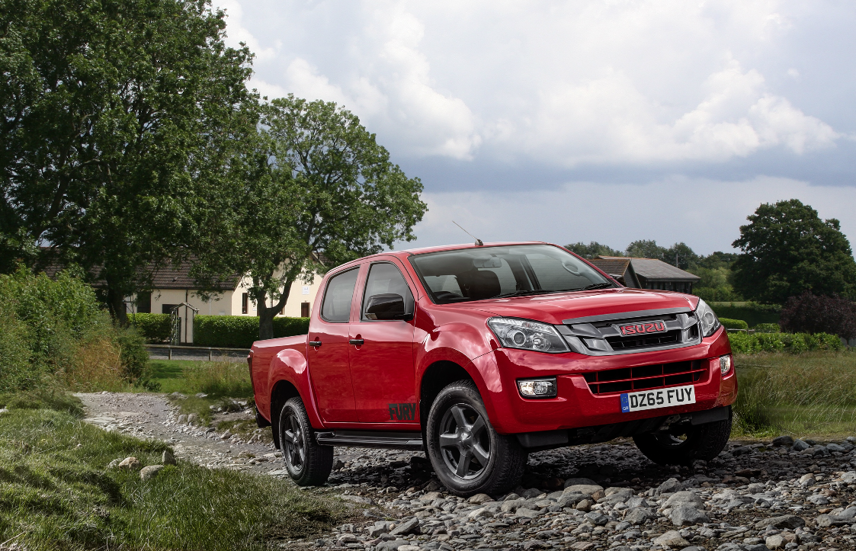Review
The country is awash with new 4x4 trucks at the moment as manufacturers jostle for a bigger share of this burgeoning market.
Ford launched a new Ranger at the end of last year, there’s a new Mitsubishi L200 on offer and the new Nissan Navara arrives on UK shores this month. Meanwhile, Renault is due to enter this sector with a rebadged Navara, while Fiat is using the L200 for its first pick-up, named the Fullback.
However, of all the major brands, it is Isuzu that has claimed the crown at the last two awards given by this magazine and its forerunner Fleet Van – the D-Max has won the title of Best 4x4 Truck for the past two years.
What swayed the judges was a mix of rugged build quality, low front-end price and the inclusion of a basic single-cab ‘cooking’ version. Some rivals – the Volkswagen Amarok, for example – come in double-cab format only and are thus less credible fleet contenders.
With so many newer rivals on offer, Isuzu has launched the Fury, a fresh version of the D-Max, in an attempt to attract fleets. The Fury is UK-specific and is offered in four formats, all featuring a number of enhancements over the Eiger model on which it is based. Prices range from £19,999 to £22,324 ex-VAT.
Our test model is the manual version and comes with a snazzy red metallic finish and five-spoke grey alloy wheels. The colour scheme continues inside the cab with red leather stitching and special carpets. A rear camera, which shows a little picture in the rear-view mirror, sounds like a great safety feature, but the screen is so small we found it almost impossible to see anything useful.
It was rather a shame that we tested the D-Max just a week after returning from the launch of the new Nissan Navara. The Navara is such a superb performer that the D-Max, in comparison, felt rather last-generation.
The on-road ride was much harsher, for example, and the long throw gearstick on the D-Max made for some rather awkward changes. Isuzu still uses leaf springs at the rear – as do all the other contenders in the sector – whereas Nissan has upgraded to coil springs on double-cab versions, thus improving general ride and handling.
Having said that, the D-Max offers build quality up there with the best – in the rough, this truck will take anything a sane driver can throw at it and more.
Under the bonnet, a 2.5-litre turbodiesel engine provides 163hp and 295lb-ft of torque. Sadly, the engine also shows itself up against the newer models. Combined fuel economy for the D-Max is 38.7mpg – which is about average for the existing models – but the new Navara does up to 44.9mpg, which means that after 80,000 miles, the Isuzu will use an extra £1,337 worth of fuel at today’s prices.
What this all adds up to is that technology is moving pretty quickly in this sector. There is a facelifted D-Max due to be launched later this year so it will be interesting to see if the Isuzu engineers can once again leapfrog the D-Max to the front of the queue.
Verdict
Most drivers will be quite happy with what the D-Max has to offer. However, from a fleet perspective, no amount of special goodies can hide the fact that the D-Max is now beginning to show its age.
Specs
| Manufacturer | Isuzu |
| Model | D-MAX Light Commercial |
| Specification | Isuzu D-Max Diesel 1.9 DL20 Double Cab 4x4 |
| Model Year | 2025.00 |
| Annual VED (Road tax) | £1035 |
| BIK List Price | £31,505 |
| CO2 | 220g/km |
| Insurance Group | N/A |
| CC | 1,898 |
| Fuel Type | |
| Vehicle Type | Pick-up |
| Luggage capacity (Seats up) | N/A |
Running Costs
| P11D | £31,505 |
| Cost per mile | 52.49ppm |
| Residual value | £14,175 |
| Insurance group | N/A |
| Fuel Type | |
| Cost per mile | 52.49ppm |
| Fuel | 17.81ppm |
| Depreciation | 28.98ppm |
| Service maintenance and repair | 5.70ppm |
Info at a glance
-
P11D Price
£31,505
-
MPG
33.6 -
CO2 Emissions
220g/km -
Payload
N/A -
Load Volume
N/A -
Load Width
N/A -
Load Length
5,265mm
















